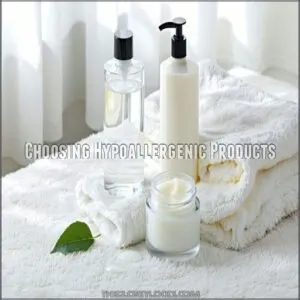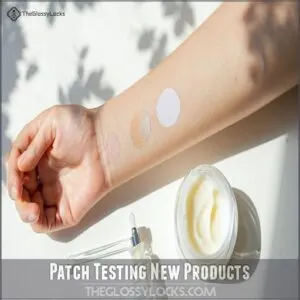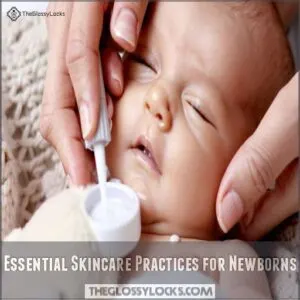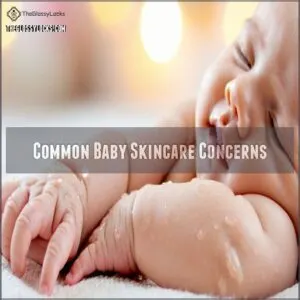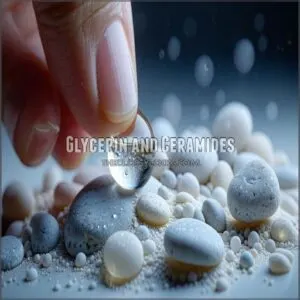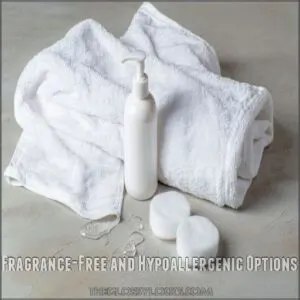This site is supported by our readers. We may earn a commission, at no cost to you, if you purchase through links.

You’ll want to choose hypoallergenic, fragrance-free products that respect your little one’s delicate skin.
Keep bath times short and sweet with lukewarm water, using mild cleansers that won’t strip natural oils. Always patch test new products and moisturize with natural ingredients like shea butter or jojoba oil.
Protect that precious skin from harsh sun with mineral-based sunscreens after six months, and dress your bundle of joy in breathable layers.
Remember, consistent, tender care is your secret weapon for baby-soft skin that’ll make everyone go "aww".
Table Of Contents
- Key Takeaways
- Characteristics of Baby Skin
- Building a Gentle Skincare Routine
- Essential Skincare Practices for Newborns
- Common Baby Skincare Concerns
- Safe Sun Protection for Infants
- Selecting Baby-Friendly Moisturizers and Lotions
- Skincare Routine Adaptations for Seasonal Changes
- Addressing Persistent Skincare Concerns
- Encouraging Healthy Skincare Habits
- Frequently Asked Questions (FAQs)
- How do you treat baby soft skin?
- What is the best skin care routine for babies?
- How do I make my baby’s skin soft?
- Do babies need a skincare routine?
- Can I use natural oils on babys skin?
- How do probiotics impact infant skin health?
- Are there genetic factors affecting baby skincare?
- What triggers unexpected skin allergic reactions?
- How does maternal diet influence infant skin?
- Conclusion
Key Takeaways
- Stick to hypoallergenic, fragrance-free products to prevent irritation and protect your baby’s delicate skin.
- Keep baths quick and use lukewarm water with gentle cleansers, followed by moisturizing right after to lock in hydration.
- Use natural ingredients like shea butter, coconut oil, or jojoba oil to nourish and protect your little one’s skin.
- Protect your baby from environmental factors with breathable clothing, mineral sunscreens (after six months), and frequent diaper changes.
Characteristics of Baby Skin
Your baby’s skin is uniquely delicate, with a thinner, more permeable structure.
This makes it more sensitive than adult skin.
Understanding these characteristics will help you develop a gentle, protective skincare routine.
This routine keeps your little one’s skin healthy, soft, and comfortable.
Thinner Skin Layers
Your baby’s delicate skin barrier is like a whisper-thin protective shield, uniquely vulnerable to external stressors.
Its incredibly thin layers make newborn skin more susceptible to damage and irritation.
Understanding this fragile skin structure helps you choose gentler cleansing methods and protective moisturizers that nurture your little one’s developing skin barrier without overwhelming its natural defenses.
Higher Permeability
After examining baby skin’s delicate structure, imagine a microscopic gateway where barriers practically melt away.
Baby skin’s higher permeability means molecular highways are wide open, accelerating dehydration risks and heightening allergen entry.
Environmental factors easily penetrate the fragile newborn skin barrier, making careful skincare a parent’s superpower in protecting this vulnerable landscape of developing hydration dynamics.
Effective skin cleansing is also essential for baby soft skin, and cleanse face daily to remove dirt, saliva, and dead skin cells.
Greater Surface Area-to-Body Weight Ratio
A newborn’s larger surface area-to-body weight ratio increases dehydration risk dramatically.
This unique characteristic means babies lose moisture faster than adults, making their delicate skin barrier more vulnerable to environmental impacts.
Careful product selection becomes essential, as their skin absorbs substances more quickly, potentially affecting overall baby skin health and hydration.
Sensitivity to Dryness and Irritation
When your little one’s skin seems more fragile than a butterfly’s wing, understanding its sensitivity becomes paramount. Baby skin craves gentle care to combat dryness and irritation.
Consider these key protection strategies:
- Use hypoallergenic moisturizers
- Avoid harsh chemical-laden products
- Select soft, breathable clothing
- Monitor humidity levels
- Apply barrier creams proactively
Dry skin solutions aren’t just about comfort—they’re your baby’s first defense against potential skin concerns.
Building a Gentle Skincare Routine
You’ll want to craft a gentle skincare routine that protects your baby’s delicate, sensitive skin from potential irritants and environmental stressors.
By choosing hypoallergenic products, avoiding harsh ingredients, and establishing a simple, consistent routine, you’ll help maintain your baby’s naturally soft and healthy skin barrier.
Choosing Hypoallergenic Products
The delicate symphony of baby skincare hinges on hypoallergenic product selection.
You’ll want to prioritize brands that specialize in gentle, fragrance-free formulations designed specifically for sensitive infant skin.
Carefully compare product ingredients that meet strict organic skincare standards.
Ingredient awareness is your superpower in protecting your little one’s precious skin.
Avoiding Harsh Ingredients
Crafting a gentle baby skincare routine means steering clear of harsh ingredients lurking in product labels.
Skip harmful chemicals like parabens, sulfates, and artificial fragrances that can irritate delicate skin.
Natural alternatives offer safer paths to baby soft skin, protecting your little one’s sensitive complexion without compromising on effective, loving care.
Patch Testing New Products
When switching from harsh ingredients, safeguarding your baby’s delicate skin demands careful patch testing.
Apply a small amount of new product to your baby’s inner forearm, waiting 24 hours to monitor any redness, swelling, or irritation.
Watch closely for unexpected reactions, ensuring your little one’s baby soft skin remains protected during this gentle skincare routine.
Establishing a Simple Skincare Routine
Because simplicity is key, your baby’s skincare routine doesn’t need to be complicated.
Start with a gentle daily routine that includes mild cleansers and quick moisturizing steps. Focus on soft, fragrance-free products designed specifically for delicate baby skin.
Keep bath time short and sweet, using lukewarm water and patting dry gently.
Consistency is your secret weapon in maintaining healthy, happy skin.
Essential Skincare Practices for Newborns
Your newborn’s delicate skin demands a gentle, thoughtful approach that protects its unique sensitivity and nurtures its natural development.
You’ll want to establish a simple, consistent skincare routine using hypoallergenic products.
These products should cleanse, moisturize, and shield your baby’s tender skin from potential irritants.
Gentle Cleansing
After building your baby’s skincare foundation, it’s time to master gentle cleansing techniques.
Use soft washcloths and lukewarm water to keep your newborn’s delicate skin clean and comfortable.
Choose a mild, fragrance-free baby cleanser specifically designed for sensitive skin.
Clean the face, neck, and diaper area daily, but resist over-washing to prevent irritation and maintain your little one’s natural protective barrier.
Moisturizing With Natural Ingredients
Gently massage natural oils into your baby’s skin right after bath time to lock in moisture.
Coconut and almond oils work wonders, mimicking the protective vernix that shields newborns.
By choosing lightweight, hypoallergenic baby lotions with natural ingredients like ceramides and botanical extracts, you’ll nourish their delicate skin without overwhelming their sensitive system.
Preventing Diaper Rash
Moisture is your enemy in the battle against diaper rash, so stay ahead of the game.
Use breathable diapers and change them frequently—your baby’s bottom will thank you!
Barrier creams with zinc oxide create a protective shield against wetness, while diaper rash cream helps soothe any developing irritation.
Your quick action prevents uncomfortable rashes and keeps your little one happy.
Creating a Soothing Bath Time Experience
After tackling diaper rash prevention, let’s make bath time a soothing sanctuary for your little one.
Keep water lukewarm and shallow, around 100°F, to protect sensitive skin.
Use minimal, fragrance-free baby wash and soft washcloths.
Incorporate calming bath toys and gentle massage to transform this routine into a bonding experience that nurtures both skin and emotional connection. This will help create a soothing sanctuary during bath time.
Common Baby Skincare Concerns
Your baby’s delicate skin can be vulnerable to various common concerns.
These concerns might leave you worried and overwhelmed.
Understanding these skincare challenges—from diaper rash to cradle cap—will help you confidently navigate your infant’s unique dermatological needs and maintain their soft, healthy skin.
Diaper Rash Causes and Treatment
In the midst of diaper changes, diaper rash can catch you off guard.
This painful skin irritation stems from moisture, friction, and chemicals trapped against your baby’s delicate skin.
Quick prevention involves frequent changes, breathable diapers, and barrier creams with zinc oxide.
For severe rashes, consult your pediatrician, but most cases respond to gentle, natural treatments that soothe and protect.
Cradle Cap Causes and Home Remedies
Those stubborn cradle cap patches can leave new parents scratching their heads.
When excess oil builds up on your baby’s scalp, those scaly white or yellow crusts appear – but don’t worry!
Gently massaging the scalp with natural oils like coconut or olive oil softens those scales.
Use a soft brush during bath time to loosen and remove the crusty buildup, keeping your little one’s sensitive skin healthy and smooth.
Infantile Acne and Heat Rash
After tackling cradle cap, you’ll want to understand two common baby skin challenges: infantile acne and heat rash.
These pesky skin conditions can worry new parents, but don’t panic!
- Infantile acne appears as small red or white bumps, typically on your baby’s face.
- Heat rash develops from blocked sweat ducts, creating tiny red blisters.
- Both conditions are temporary and usually resolve without intervention.
Gentle care is your best defense.
Milia and Irritant Contact Dermatitis
Just when you thought infantile acne was tricky, milia and irritant contact dermatitis enter the scene.
Those tiny white bumps (milia) and red, angry skin patches can make parents worry.
But don’t panic! Most cases resolve naturally.
Gentle cleansing, avoiding harsh products, and keeping skin dry can help prevent these common newborn skincare challenges.
When in doubt, chat with your pediatrician.
Safe Sun Protection for Infants
Your baby’s delicate skin needs extra protection from harmful sun rays, making safe sun care essential for their health and comfort.
By choosing the right mineral-based sunscreen and implementing smart sun protection strategies, you’ll shield your little one from potential skin damage.
Enjoy outdoor moments together.
Choosing Mineral-Based Sunscreens
Mineral-based sunscreens are your best bet for shielding your little one’s delicate skin.
These zinc oxide and titanium dioxide powerhouses create a protective barrier, reflecting harmful UV rays without harsh chemicals.
Opt for broad-spectrum options with SPF 30+, designed specifically for baby skin’s unique sensitivity. Choose hypoallergenic, fragrance-free brands that prioritize gentle, safe sun protection.
Applying Sunscreen After Six Months
After six months, introducing sunscreen becomes a vital shield for your baby’s delicate skin.
Pediatricians recommend broad-spectrum SPF 30+ mineral-based formulas specifically designed for infants.
Always consult your healthcare provider first, patch test new products, and apply sunscreen generously to exposed areas, ensuring complete coverage and protection against harmful UV rays during outdoor adventures.
Protective Clothing and Physical Barriers
When protecting your baby from harsh sunlight, dress them in lightweight, UV protective clothing that shields delicate skin.
Sun hats with wide brims and breathable fabrics create a vital defense against sun damage.
Opt for baby wraps and stroller shades that offer additional coverage, ensuring your newborn’s sensitive skin remains safe and comfortable during outdoor adventures.
Avoiding Direct Sun Exposure
You’ve shielded your little one with protective clothing, and now it’s time to master sun safety. Direct sunlight is a no-go for delicate baby skin.
Keep your newborn away from harsh rays by following these sun protection tips:
- Seek natural shade under trees or umbrellas
- Plan outdoor activities during early morning or late afternoon
- Use strollers with full canopies
- Create your own shade bubble wherever you go
Selecting Baby-Friendly Moisturizers and Lotions
For your baby’s delicate skin, choosing the right moisturizer is not just about softness—it’s about protection and health.
You’ll want to select hypoallergenic, fragrance-free options.
These options should be packed with natural ingredients like shea butter, jojoba oil, and chamomile extract.
These natural ingredients nourish and shield your little one’s sensitive skin.
Natural Butters and Oils
Shea and cocoa butters stand as your tiny superhero’s moisture guardians in natural baby skincare.
These luxurious natural butters provide intense hydration, creating a protective barrier that keeps delicate skin soft and supple.
| Butter/Oil | Key Benefits | Best For |
|---|---|---|
| Shea Butter | Deep moisturizing | Dry, sensitive skin |
| Cocoa Butter | Skin protection | Preventing chapping |
| Jojoba Oil | Balanced hydration | Normalizing skin moisture |
| Almond Oil | Gentle nourishment | Sensitive baby skin |
| Coconut Oil | Antibacterial | Soothing minor irritations |
Botanical Extracts and Minerals
Explore botanical extracts like aloe vera, chamomile, and calendula to soothe your baby’s delicate skin naturally.
These gentle minerals work wonders, calming irritation and providing a protective shield against skin sensitivities.
Organic baby skincare harnesses nature’s healing power, offering safe, gentle remedies that nurture your little one’s sensitive complexion with botanical benefits.
Glycerin and Ceramides
After exploring botanical extracts, let’s zoom in on glycerin and ceramides – your baby’s skin’s secret weapons. These powerhouse ingredients work magic in keeping your little one’s skin soft and protected.
Here’s why they’re game-changers:
- Locks in moisture like a loving embrace
- Rebuilds skin’s natural protective barrier
- Soothes dry, sensitive skin with gentle care
- Creates a shield against environmental irritants
Ceramides mimic your baby’s natural skin lipids, while glycerin draws and seals in hydration, making them must-haves in baby skincare.
Fragrance-Free and Hypoallergenic Options
Dodge those sneaky irritants by zeroing in on fragrance-free and hypoallergenic baby products that protect your little one’s delicate skin.
When shopping, scan labels for words like "hypoallergenic" and carefully review ingredient lists, avoiding potential triggers.
Prioritize brands that specialize in sensitive skincare, offering gentle formulations designed specifically for your baby’s unique needs.
Skincare Routine Adaptations for Seasonal Changes
Your baby’s skin changes with the seasons, demanding a customized care approach.
This approach protects and nourishes their delicate complexion.
Learn how to adapt your skincare routine to maintain ideal hydration and prevent dryness.
Understanding the unique challenges each season presents to your little one’s sensitive skin is key.
Thicker Moisturizers for Colder Months
Typically, winter skin woes demand extra TLC for your little one’s delicate complexion. Cold weather demands a strategic approach to baby moisturizer selection to combat dry skin solutions.
Here’s your winter skincare game plan:
- Switch to thicker, richer creams
- Layer moisturizers for maximum protection
- Choose petroleum-free, natural baby creams
- Apply moisturizer immediately after bathing
- Use fragrance-free, hypoallergenic formulations
Baby moisturizer selection is key for combating dry skin in winter. Winter skincare game plan provides solutions for protecting delicate skin.
Adjusting Bathing Frequency
When winter’s chill sets in, you’ll want to adjust your baby’s bath frequency carefully.
Cold months can dry out delicate newborn skin, increasing eczema risk.
Stick to 2-3 baths per week using lukewarm water and a gentle baby wash.
This gentle baby skincare routine helps prevent overdrying while keeping your little one clean and comfortable during seasonal changes.
Maintaining Skin Hydration
After adjusting your baby’s bath routine, keep their skin glowing with smart hydration strategies.
Invest in baby-friendly lotions packed with natural oils like jojoba and almond.
Use a humidifier to combat dry indoor air, locking moisture into your little one’s delicate skin.
Gently massage baby lotion to seal in hydration and promote healthy skin development.
Preventing Overdrying
Cold winds and indoor heating can strip your baby’s delicate skin faster than a summer sunburn. Prevent overdrying with these game-changing strategies:
- Crank up the humidifier and watch your little one’s skin drink in moisture
- Layer lightweight, breathable clothing to protect against harsh environments
- Choose oil-based, fragrance-free moisturizers that lock in hydration
- Adjust bath timing to minimize skin stress during dry seasons
Addressing Persistent Skincare Concerns
You’re not alone in facing persistent baby skincare challenges that can leave you feeling overwhelmed and uncertain.
By understanding when to seek professional advice, prioritizing hydration and nutrition, and selecting fragrance-free, hypoallergenic products, you’ll be equipped to navigate even the most stubborn skin concerns with confidence and care.
When to Consult a Pediatrician
When five or more red flags pop up on your baby’s skin, it’s time to hit pause and call the pediatrician.
Persistent rashes, severe dryness, unusual bumps, or worsening eczema aren’t just cosmetic concerns—they’re potential signals of deeper baby skin irritation.
Don’t play guessing games with newborn skin conditions; professional guidance safeguards your little one’s comfort and health.
Prioritizing Hydration and Nutrition
Hydration transforms your baby’s skin health, creating a radiant foundation for growth. Smart nutritional choices directly impact skin resilience and moisture retention.
- Boost water intake while breastfeeding to support skin hydration
- Choose nutrient-dense foods that enhance skin’s natural moisture barriers
- Priorit
Using Fragrance-Free and Hypoallergenic Products
Your baby’s skin deserves a clean slate, free from hidden hazards lurking in product ingredients. Hypoallergenic skincare can feel like a detective mission.
We’ve got your back! Check out this quick guide to choosing the safest products for your little one’s delicate skin.
| Ingredient Type | What to Avoid | Safe Alternatives |
|---|---|---|
| Fragrances | Artificial scents | Natural botanical extracts |
| Preservatives | Parabens | Vitamin E, natural plant extracts |
| Chemicals | Sulfates | Gentle, plant-based cleansers |
| Additives | Synthetic colors | Mineral-based ingredients |
| Emulsifiers | PEG compounds | Natural oils and butters |
Safest products for delicate skin. Choosing safe skincare for your baby.
Encouraging Healthy Skincare Habits
Your baby’s skin is a delicate ecosystem that requires consistent, gentle care to maintain its natural balance and radiance.
By establishing a thoughtful skincare routine early on, you’ll help protect your little one’s sensitive skin and set the foundation for lifelong healthy habits.
Establishing a Consistent Skincare Routine
Crafting a newborn skincare routine means setting a consistent rhythm that dances with your baby’s delicate needs.
Establish a gentle baby skincare routine by choosing fixed times for cleansing, moisturizing, and diaper changes.
Stick to simple, predictable steps that align with your infant’s natural daily patterns, making each skincare moment a calm, nurturing connection. newborn skincare routine and gentle baby skincare routine.
Educating Caregivers on Skincare Best Practices
Building on a consistent skincare routine, educating caregivers becomes your superpower in baby skincare. Knowledge transforms uncertainty into confident care.
- Challenge skincare myths with evidence-based practices
- Master product safety through careful research
- Learn expert Q&A techniques for newborn skin concerns
Empower yourself with accurate, gentle skincare guidance that protects your little one’s precious skin.
Promoting Healthy Skin Development
A nurturing baby skin development approach empowers parents to protect their little one’s delicate epidermis. Understanding the fundamentals of healthy skin care is essential for preventing dryness and soothing potential irritations.
| Baby Skin Development Stage | Key Focus Areas |
|---|---|
| Newborn | Gentle protection |
| 0-3 months | Hydration management |
| 3-6 months | Barrier function support |
| 6-12 months | Environmental adaptation |
Consistency and gentle care are your most powerful tools in maintaining your baby’s skin health.
Monitoring Skin Health
As you nurture your little one’s healthy skin development, stay vigilant about subtle skin changes.
Keep an eye out for rash types, dryness signs, and irritation spots that might signal underlying issues.
Regular gentle checks can help you maintain your baby’s healthy glow, catching potential concerns early and ensuring your newborn’s skin remains soft, supple, and radiant.
Frequently Asked Questions (FAQs)
How do you treat baby soft skin?
Care for your baby’s delicate skin with gentle, fragrance-free products.
Keep their skin clean and moisturized, using hypoallergenic lotions and barrier creams.
Bathe sparingly, pat dry softly, and shield them from harsh environmental elements.
What is the best skin care routine for babies?
Imagine your baby’s delicate skin as a fragile canvas.
You’ll want to cleanse gently with lukewarm water.
Use hypoallergenic moisturizers, change diapers frequently, and apply barrier creams.
Protect from harsh environments for radiant, healthy skin.
How do I make my baby’s skin soft?
Keep your baby’s skin soft by using gentle, fragrance-free moisturizers with natural ingredients like shea butter and jojoba oil.
Bathe sparingly, pat dry gently, and apply hypoallergenic cream to lock in moisture and protect their delicate skin.
Apply hypoallergenic cream to lock in moisture.
Do babies need a skincare routine?
With skin 20 times thinner than adults, babies do need a skincare routine.
You’ll want to gently cleanse, moisturize, and protect their delicate skin using hypoallergenic products.
Focusing on minimal, soothing care that keeps their skin healthy and comfortable.
Can I use natural oils on babys skin?
You’ll want to be cautious with natural oils.
Some, like coconut or jojoba, can be gentle, but always consult your pediatrician first.
Patch test carefully and watch for any skin reactions before widespread use.
How do probiotics impact infant skin health?
Probiotics can help balance your infant’s skin microbiome.
They might decrease eczema risk and improve overall skin resilience.
Potentially reducing inflammation and supporting healthy skin barrier function by promoting beneficial bacterial growth.
Are there genetic factors affecting baby skincare?
Genetic predispositions can influence your baby’s skin sensitivity, eczema risk, and allergic tendencies.
Inherited traits might determine skin barrier function, making some infants more prone to dryness, inflammation, and specific dermatological conditions.
What triggers unexpected skin allergic reactions?
Almost 60% of babies experience allergic reactions from hidden irritants.
You’ll want to watch for sudden rashes, redness, or swelling after introducing new foods, skincare products, or environmental triggers like detergents, fabrics, or airborne allergens.
How does maternal diet influence infant skin?
Your nutrition directly impacts your baby’s skin health.
What you eat can influence inflammation, hydration, and skin barrier function.
Breastfeeding moms should focus on omega-3 rich foods, stay hydrated, and consume antioxidant-packed fruits and vegetables.
Conclusion
Caring for your baby’s skin doesn’t need to be overwhelming.
With a gentle skincare routine for baby soft skin, you’ll protect their delicate layers while avoiding irritation.
Focus on hypoallergenic, fragrance-free products, short baths, and natural moisturizers to keep their skin healthy.
Seasonal adjustments and consistent care are key.
If concerns persist, consult a pediatrician for guidance. By making thoughtful choices, you’ll nurture their soft, glowing skin and promote their comfort every step of the way.
- https://bbox.com.au/blogs/all/nurturing-baby-skin-a-skincare-experts-guide-to-gentle-skincare-for-infants-and-toddlers
- https://www.sparshhospital.com/blog/skincare-for-newborns-baby-soft-skin-needs-nurturing-too/
- https://cittaworld.com/blogs/news/baby-soft-solutions-creating-an-effective-skincare-routine-for-your-baby-s-delicate-skin
- https://www.stanfordchildrens.org/en/topic/default?id=bathing-and-skin-care-for-the-newborn-90-P02628
- https://us.embryolisse.com/blogs/beautiful-skincare-tips/baby-soft-skin-exfoliating-coconut-powder


